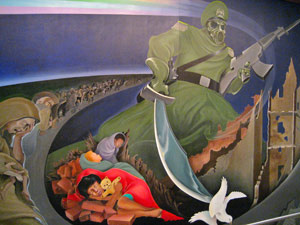Just because you’re paranoid doesn’t mean they’re not out to get you…
There is a curious relationship between psychology and the study of conspiracy theories. Historians, philosophers, sociologists and political scientists often present conspiracy theories as being of an essentially psychological nature.

A detail of a mural in Denver International Airport, subject of much conspiracy theorist interest. A plea for peace, or a plan for future martial law?
Many such writers describe belief in conspiracies as manifestations of ‘paranoia’, ‘anxiety’, ‘fantasy’, ‘hysteria’ and ‘projection’, or as fulfilling a profound psychological need for certainty in the precarious (post-)modern age. In everyday discourse too, ‘conspiracy theorists’ are often labelled ‘lunatics’, ‘kooks’ or ‘paranoiacs’, implying that they suffer from some intrinsic psychological deficiency or dysfunction.
Yet, surprisingly, little psychological research has been conducted on this topic. In fact, it is only since the 1990s that social psychologists have turned their attention to the conspiracy theory phenomenon and scrutinised its psychological roots in a systematic way.
Investigating the conspiracy theorist
Much psychology research has focused on identifying factors which predispose certain individuals to endorse conspiracy theories. Given that not everyone believes in conspiracy theories, psychological studies have sought to uncover what distinguishes believers from non-believers, and in so doing create a "psychological profile" of conspiracist individuals.
Researchers have explored the relevance of more general demographic factors like gender, socio-economic status, educational level or ethnic background and so on, but also things like disenchantment with political authority, sense of powerlessness, political cynicism, authoritarianism or alienation from society.
They have also looked at personality factors and aspects of cognitive functioning (resistance to disconfirming evidence, tendency to circular thinking, attributional styles, etc.) to see whether conspiracism is underpinned by some intrinsic perceptual or reasoning deficit which leads people to misunderstand or misinterpret causal relations in the world.
Overall, this quest for the psychological profile of conspiracy theorists has yielded modest results. Conspiracy theorists have been shown to be quite similar to sceptics in terms of cognitive functioning or personality. In fact, the only consistent finding is that believers tend to be disenchanted with authority and cynical about the mainstream of politics.
But this is hardly surprising: these are the central motifs of any conspiracy theory!
Look again…
One possible reason why the psychology of conspiracy theories produced so few meaningful results is that researchers have been approaching this phenomenon in the wrong way. They have tended to see conspiracy theories first and foremost as
individual beliefs, thereby reducing them to events that are going on inside a person’s mind (information processing biases, personality characteristics, etc.).
But conspiracy theories are not just a set of individual attitudes.
Did you hear about…?
Anyone who has had the opportunity to engage with conspiracy theories will realise that they are, in fact, a dynamic set of stories and
shared assumptions about the world which persist and evolve over time. As such, they are continuously exchanged, debated, evaluated and modified as people try to make sense of the world and events around them.
Also, conspiracy theorising is more often than not a shared endeavour and a social activity, performed through organisations, movements, campaigns, or through jointly produced websites and internet forums.
This means that conspiracy theories are least interesting (or least damaging) when they are confined to a person’s head; they are far more interesting when they are in the public domain, circulating as a set of ideas – on the basis of which movements are established, political projects forged and power relations challenged and sustained.
A theory of conspiracy theories
Where does this leave the psychology of conspiracy theories? Clearly, looking for stable psychological characteristics or cognitive biases that differentiate believers from sceptics may not be the most productive avenue for research to pursue. Instead, the focus should be turned to the study of conspiracy theories as a social and ideological phenomenon.
As a number of social psychologists (including Henri Tajfel, Michael Bilig, Keneth Gergen or Serge Moscovici) have argued over the years, psychology ought to be turning its attention away from looking for psychological underpinnings of social phenomena and consider instead how specific ideologies, worldviews and cultural traditions produce particular patterns of thinking and behaviour.
Put differently, it is not that ‘faulty reasoning’
causes people to endorse conspiracy-based explanations, but rather that something within those explanations, within their thematic configuration, narrative structure and explanatory logic, leads people to exhibit these seemingly ‘faulty’ patterns of thought.
This suggests that the central object of study should be the structure, logic and evolution of conspiracy theories, with a view to explaining how and why this tradition of explanation persists in modern society, and how it sustains distinct forms of individual and collective thought and action.

